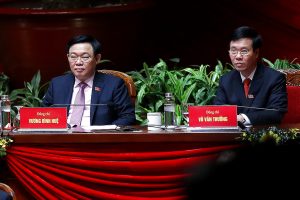Vietnam’s National Assembly has selected Vo Van Thuong as the country’s new president, following the forced resignation in January of his predecessor amid a wide-ranging anti-graft campaign. The vote, which took place during an extraordinary session of the assembly today, came a day after the Central Committee of the Communist Party of Vietnam (CPV) formally nominated Thuong for the vacant position.
In his first speech to the parliament as the new president, which was broadcast on state TV, Thuong promised to “resolutely” continue the fight against corruption, Reuters reported. “I will be absolutely loyal to the fatherland, the people and the constitution, striving to fulfill the tasks assigned by the party, the state and the people,” Thuong told the body.
At 52 years of age, Thuong is currently the youngest member of the CPV’s Politburo, Vietnam’s highest decision-making body. His election to the post of state president, one of the country’s four apex political positions – the three others are CPV chief, prime minister, and National Assembly chairperson – comes as no surprise. Indeed, it has been widely rumored since mid-February when the Politburo reportedly settled on him as a replacement for Nguyen Xuan Phuc, who resigned (or was pushed to do so) in January.
The cashiering of Phuc came as a result of “violations and wrongdoing” by officials under his control, who were caught up in CPV General Secretary Nguyen Phu Thong’s wide-ranging anti-corruption hunt and followed the resignation of a number of cabinet-level officials, including former Foreign Minister Pham Binh Minh.
Specifically, Phuc was forced to dive on his sword over two pandemic-era corruption scandals, one involving COVID-19 test kits and the other involving repatriation flights for Vietnamese citizens stranded abroad, that took place on his watch.
A close ally of Trong – Carl Thayer of the Australian Defence Force Academy in Canberra has described him as “a trusted member of Secretary General Trong’s inner circle” – Thuong is a relatively safe choice who seems to have won out over more prominent and powerful figures.
Minister of Public Security To Lam, a figure that many observers had previously viewed as a leading candidate to replace Phuc, reportedly withdrew his name from consideration for the role. In a comprehensive article for Fulcrum, Le Hong Hiep of Singapore’s ISEAS-Yusof Ishak Institute speculated that Lam’s nomination “may have faced resistance from other Politburo members, who could be concerned about the influence of the public security apparatus on the country’s political system,” given that Prime Minister Pham Minh Chinh has a similar background in the CPV securocracy.
Hiep said that some other considerations may also be at play. The CPV may have wanted to restore the lapsed norm of having balanced regional representation in the four main leadership posts. (Thuong is from Vinh Long province in the south.) It is also likely that having a loyalist in the presidency could re-facilitate the coming leadership transition as Trong, now deep into an unprecedented third term in the role of party chief, contemplates life after politics.
“The decision to replace Phuc with Thuong as president and finalize his election this week instead of waiting until the National Assembly reconvenes in May can thus be viewed as a way to expedite Trong’s succession plan,” Hiep wrote.
There is even the possibility that the relatively youthful Thuong may be viewed as a potential future replacement for Trong, if not at the next CPV National Congress in 2026, then at some point further down the line. This sentiment was echoed by a Hanoi-based diplomat, who told Reuters that in choosing Thuong, the CPV leader was “ensuring he has an acceptable successor in the mix.”

































